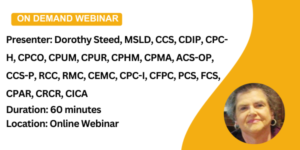Conference Material (Password Required)
Beckers Healthcare states “The house always wins” as Insurers’ record profits clash with hospitals’ hardship. As a matter of fact, with most healthcare organizations having now released their third-quarter earnings, the gap between provider and payer profits continues to widen. It is startling that over half of hospitals will have negative margins through 2022. Becker is not alone in their sentiment. A new American Hospital Association (AHA) report shows that hospitals are facing the most difficult year financially since the start of the pandemic as expenses and margins fail to hit pre-pandemic levels. The cat is out of the bag. Payers are looking at record profits while providers are looking at record losses.
How can this be as our health systems went through (and continue to go through) a health pandemic? It is because denials, specifically complex audits are on the rise.
One type of complex audit is a post-payment audit (often referred to as a RAC audit). Various experts from the RAC Monitor (which for many years has been the industry gold standard for audits) have stated over the last five years post-payment audits have risen by over 900%. The Biden Administration has provided funding for CMS to conduct more RAC audits, so this trend, while shutting down momentarily during the height of the pandemic is back on with a vengeance.
The Emergency Department Practice Management Association (EDPMA) has reported a large increase in medical necessity audits (another type of complex audit) among their members. Notable expert and Board of Director Member Andrea Halpern Bryant of EDPMA has confirmed their members (many of whom are intimately involved in emergency department matters) are seeking guidance for assistance in dealing with the growing number of medical necessity audits.
Unfortunately dealing with complex audits has become more difficult as providers have experienced major decreases in staffing. I-Med Claims blog stated “Efforts to reduce hospital workforces during the pandemic have forced revenue cycle teams to redeploy existing staff to new areas. One consequence of this shift is that there is no suitable expertise to master complex and ever-changing payment standards”. More than half of RCM department leaders state that their departments are down by 20 or more people.
This session will instruct the listeners on how to respond and win more complex audits with fewer people. Listeners will be taken through the up to the five-step process of a RAC audit including receipt of the letter from the auditor and learning of strategies and processes that will help them respond to them (in less time and with greater success). In addition to CMS audits, the listeners will be given strategies and processes to help respond to private payer post-payment audits as well. The listeners will also learn helpful, winning strategies for medical necessity pre-payment audits. They will learn of the five most common audits and be given ideas and processes to have greater success in response with fewer assets at their disposal. Lastly, strategy and processes will be shared to lessen a load of incoming audits for the future by using data to the provider’s benefit.
If you want to learn how to do more with less and have greater success, please join us as we help you combat bad payer behavior as it pertains to complex audits!
Learning Objective:
- Learn the levels of a denial
- Learn the best responses to a denial
- Learn how to exercise full disclosure
- Learn how to manage denials across the healthcare continuum
- Learn how to manage denials with fewer people
- Learn how to train people to respond properly
- Learn how processes and technology can be leveraged
- Learn how to share key and important data with management
- Learn how to use the information to combat future denials
- Learn how to effectively communicate with team members
- Learn how to operate effectively within existing silos
- Learn how to avoid potential traps in your responses
- Learn how to respond to an initial request for documentation
- Learn what procedures and practices are at risk for denials
- Learn how the OIG decides what to audit and what they look for
- Learn how Artificial Intelligence is deployed by auditors
- Learn what a Medical Contractor is
- Learn how private payers and CMS differ in how they audit
Areas Covered in the Session:
- Private Insurance Post-Payment Audits
- RAC Audits
- Private Insurance Pre-Denials for Medical Necessity
- CMS Pre-Denials for Medical Necessity
- Various Rules for responding
- The various auditor landscapes
- History of Denials
- Current state of Denials
- Future of Denials
- Potential penalties that may be incurred
- Critical Nature of Time
- Additional Requests for Documentation (ADRs)
- Auditors Mindsets
- Levels 1-5 of an audit
- The initial purpose of Denials
- The Dos and Don’ts when communicating with auditors
Related Webinar
Suggested Attendees:
- Anybody responsible for responding to denials at a provider
- Compliance Director
- Compliance Analyst
- Manager Revenue Integrity
- Case Management Denials Prevention
- Nurse Auditor
- Program Manager
- Government Reimbursement Specialist
- Coordinator of Clinical Audits and Disputes
- C Level Executives
- Revenue Cycle Management Staff and Executives
- Compliance Officers
- Medical Office Manager
- EHR Information Staff
- Clinical Denials Coordinator
- Compliance Program Manager
- CFO
- Auditors
- Audit Coordinator
- HIM Executives
- Manager of UR and Denials
- Billers
- Coders
- Medical Billing Companies
- Office Staff and Billing Managers
- Revenue Cycle Management Vendors
- EHR Vendors
- Audits and Appeal Personnel
- Post Service Personnel
- Accounts Receivable Personnel and Management
- Emergency Department Personnel and Management
- Directors
- HIM Data Analyst
- Medicare Coding Expert
Presenter Biography:
Kevin Lasser is a long-time healthcare start-up specialist who invests in and builds technology companies that make it easier for stakeholders to perform their jobs at greater efficiencies, and therefore make their organizations more profitable and efficient.
After experiencing success in the financial services industry – Kevin’s first foray into health tech was as co-founder of JEMS Telehealth in 2005. JEMS was arguably the first mobile telehealth solution and ultimately had hundreds of clients (ranging from large hospitals to large physician practices). After a successful exit, he invested in and became the CEO of RevKeep, a best-in-practice healthcare software solution that addresses healthcare denials.
A graduate of the University of Michigan Business School with high honors, he is involved in various, not-for-profit organizations, and has received numerous awards for entrepreneurship. Kevin prioritizes family first and is a lifelong Detroit and University of Michigan sports fan.
Snippet From Our Previous Session
TESTIMONIALS
“Jim Sheldon-Dean’s insights on privacy and security were very much helpful to our team, it was great to learn from an instructor like him. Appreciate!” –CHRISTINE JACOB MD, CDI SPECIALIST
“This program on HIPAA did a great job providing actionable concepts in a way that updated our team and me, I now know how I will implement the concepts because I already did it in their online seminar, it was easy to ask questions from the speaker at the end of my 60 minutes course.” –MELISSA PRESTON, HEALTH INFORMATION MANAGEMENT STAFF
“The workshop was very insightful and made absolute sense in terms of the regulations and their compliance. I am thankful for having the opportunity to attend.”–BARBARA CAPRIOTTY, REHABILITATION DIRECTOR

